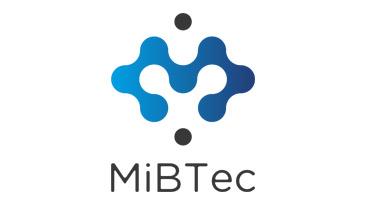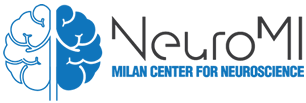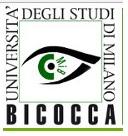Research Centres
Research Centres - Departmental
The Department of Psychology is home to several research centres staffed by several of the department's researchers and lecturers:

BiCApP - Bicocca Center for Applied Psychology
The BiCApP - Bicocca Center for Applied Psychology is a research center focused on the study of human factors in interaction with technology and the development of portable and wearable technologies to improve the quality of life and well-being of people.
Scientific Director: Prof. Emanuele Preti

MiBTec - Mind and Behavior Technological Center
The MiBTec - Mind and Behavior Technological Center is a research center focused on the study of human behavior and the interaction between humans and technologies through the use of virtual reality (VR), augmented reality (AR), and mixed reality (MR).
Scientific Director: Prof. Alberto Gallace

The centre, which was established in 2005 by the Department of Psychology with the participation of the Department of Legal Systems, focuses on the ongoing scientific project of identifying, collecting, preserving and enhancing online documentary sources relating to the history of Italian psychology, and more generally to the history of the ‘sciences of the mind’. The work team consists of archivists, psychology historians and science historians, who over the years – thanks to fruitful cooperation with computer experts and designers – have acquired sufficient autonomy to manage the web portal, the virtual place where almost all of the centre's work is concentrated.
The work team consists of archivists, psychology historians and science historians, who over the years – thanks to fruitful cooperation with computer experts and designers – have acquired sufficient autonomy to manage the web portal, the virtual place where almost all of the centre’s work is concentrated.
Thanks to a policy of openness and active collaboration with private individuals and other institutions that maintain similar archives, Aspi has established a network of contacts that currently includes around one hundred collaborators throughout Italy.
Director Prof. Mauro Antonelli – Archivist Dr. Paola Zocchi
Research assistant Dr. Aurelio Molaro
Location: U6, Floor 3, Room 3029-B – U6, Floor 2, Library, Room B205
Research Centres - Interdepartmental
The department collaborates with numerous interdepartmental research centres affiliated with several other university departments:
The centre organises seminars on gender issues open to citizens and delivered by subject matter experts, field workers, journalists, professionals, associations, policy makers and social partners.
Also with regard to raising awareness on gender issues, some of the department’s lecturers have been teaching for several years on the ‘Women, Politics and Institutions’ course, sponsored by the Ministry of Equal Opportunities and aimed at female students and workers of all ages, with the aim of promoting women’s participation in national and local politics and institutions.
The centre aims to be a centre of excellence for the subject of food and health approached from a multidisciplinary perspective. The centre aims to bring together research and innovation activities in the food sector with a focus on actions aimed at the relationship between food and health, prevention and human well-being. The centre’s key goals are: 1) To develop operational structures that can meet the specific needs of companies, research organisations and associations; 2) To set up joint labs with companies, spin-offs, and associations on specific food-related topics; 3) To participate as a recognised body in national and international projects; 4) To support higher education activities within the framework of master’s and doctoral projects. The centre is affiliated with 9 departments of the University of Milan Bicocca and has over 100 members. Best4food currently has €10 million in funding through the FoodNet and SASS (agricultural systems and sustainable development) projects.

The centre promotes multidisciplinary research and high-level training in the field of neuroscience with the aim of studying function and malfunction mechanisms of the nervous system at various ages of life. The centre’s work covers a broad spectrum of approaches and topics: Biotechnology and Nanomedicine, Clinical Neuroscience, Cognitive and Behavioural Neuroscience, Computational and Systems Neuroscience, Molecular and Cellular Neuroscience, Neuroimaging and their methodologies.
NeuroMi organises an annual international advanced training conference to showcase the scientific work of its members in relation to the contribution of researchers from other universities, both Italian and foreign. The conference covers topics of broad interest in the spirit of a cross-sectoral, interdepartmental and therefore multidisciplinary approach to neuroscience issues.
The centre aims to contribute to the advancement of knowledge in the social sciences through an interdisciplinary approach with contributions from economists, psychologists, sociologists, lawyers and statisticians. Some of the research programmes developed by the centre include, for example: the development and change of regulations and institutions, the relationship between behaviour and rationality, the evolution of urban contexts, and digital well-being.

The centre, which was established in 2015 in the Department of Materials Science, aims to be a platform for the coordination and aggregation of the different expertise working in the field of vision science.
The centre’s main aims are: To promote and develop new research in optometry and contactology, supporting interaction and collaboration between different fields such as Optics and Optometry, Physics, Materials Science, Psychology, Biology, Chemistry, Medicine, Informatics, and Biostatistics. To initiate collaborations with public and private organisations (e.g. schools, sports centres, companies) to also carry out visual screening and analysis in the field. To organise events, seminars, and training activities for professionals in the sector, also acting as an academy for companies interested in high-level training and refresher courses by putting the centre’s facilities and expertise at their disposal.
The centre comprises 12 departments (all the departments of Bicocca except Mathematics and Medicine), is based in the Department of Materials Science, and its current director is Prof. Marco Martini of the same department. The centre is concerned with cultural heritage activities.
The centre, which was established in 2015 and includes eight of the university’s departments, serves as an Italian reference point for the archiving and distribution of research data. Unidata primarily acts as an Open Access Data Repository, preparing code books for users and updating formats. It handles the provision of DOIs to the deposited data archive for citations. Additionally, the archive works in the area of standardisation of the information available on data for research (metadata) and promotes the dissemination in Italy of the main national and international surveys (Eurobarometer, European Social Survey, Word Value Survey, etc.). In this regard, it provides services to shorten and simplify the processes of acquiring and preparing data for subsequent analysis. For the metadata research and methodological aspects involved in the surveys, UniData uses NESSTAR (Networked Social Science Tools And Resources), a specific software developed in collaboration with the CESSDA (Council of European Social Science Data Archives). In relation to the ISTAT surveys, Unidata is involved in requesting the microdata made available by ISTAT by labelling the variables, values and converting them into the format that is most useful to the user. It is part of the ICPSR (Inter-University Consortium for Political and Social Research) founded in 1962 at the University of Michigan, U.S.A.
The centre seeks to promote, develop and coordinate studies and research in the fields of the philosophy of health and illness, or more generally, the philosophy of medicine. Philosophy of medicine deals with methodological and conceptual issues underlying medical disciplines, the concepts of disease, causality, evidence, the nature of medical reasoning and decision-making, critique and integration of existing paradigms, and ethical issues relating to public health and the doctor-patient relationship.
The centre aims to bring together in a single university facility the methodologies, skills and computational capabilities needed to meet the challenges of quantitative and personalised medicine.